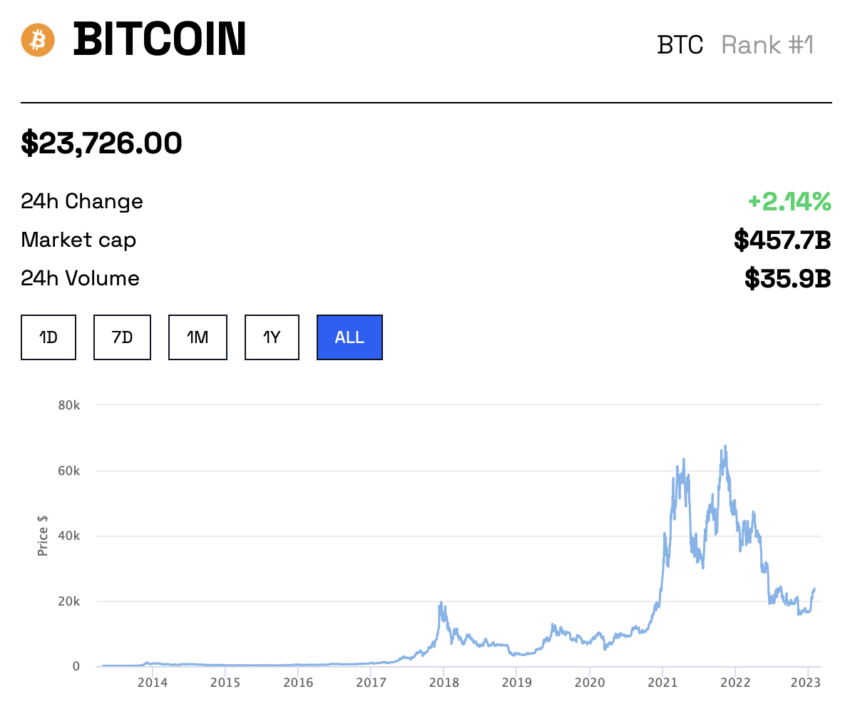In recent years, many countries have boosted their imports of precious metals, including gold and silver, as a way to diversify their reserves and protect against economic uncertainty.
Now, some experts are asking if Bitcoin and other cryptocurrencies will be the next addition to central banks’ portfolios.
Time to Ditch Precious Metals for Bitcoin?
Precious metals have long been considered a safe haven for investors and a hedge against inflation. As a result, central banks have been increasing their purchases of gold and silver.
“The central bank sector has been one of the highlights of the gold market in 2022, having bought a net 673 tonnes between Q1 and Q3. Looking ahead to the full year picture, it’s likely that central banks accumulated a multi-decade high level of gold in 2022,” noted Krishan Gopaul, senior analyst EMEA at WGC.

However, the rise of cryptocurrencies has sparked a new debate among economists and financial experts. Bitcoin, in particular, has gained widespread attention for its potential as a store of value, much like gold. It has also seen rapid growth with its value increasing by over 900% in the past five years alone.
Some central banks have already begun exploring the possibility of adding crypto to their reserves. Still, many remain skeptical about the stability and long-term viability of these digital assets. Critics argue that the decentralized and unregulated nature of cryptocurrencies makes them susceptible to manipulation and hacking.
Others, however, see cryptocurrencies as a natural evolution of money and a potential replacement for traditional fiat currencies. They point to the increasing use of crypto in daily transactions and the growing number of merchants who accept them as payment.
Despite the ongoing debate, one thing is certain: the world of finance is changing rapidly. Central banks will need to consider all options to stay ahead of the curve. Whether it’s precious metals, cryptos, or a combination of both, central banks will have to weigh the risks and benefits to protect their reserves and ensure financial stability.
Whether Bitcoin will become a regular part of central bank portfolios remains to be seen, but it’s clear that the conversation around cryptocurrencies and their role in the financial world will only continue to grow in the coming years. This can especially be seen in the number of publicly traded companies that have added BTC to their balance sheets.
Mainstream Acceptance
As Bitcoin continues to gain popularity and mainstream acceptance, a growing number of publicly traded companies have added the crypto to their balance sheets. This move has sparked a new trend in corporate finance. It has also raised questions about the role of cryptocurrencies in the traditional financial system.
One of the first companies to embrace Bitcoin was Tesla, which invested $1.5 billion in the cryptocurrency in February 2021. Since then, other companies such as Square and MicroStrategy have followed suit. Both firms investing billions of dollars in Bitcoin and reporting significant returns on their investments.
Many experts believe that these investments are a sign of the growing maturity and stability of the cryptocurrency market. Bitcoin has long been considered a speculative asset. Still, the recent influx of institutional investment has given the crypto a level of credibility and mainstream acceptance.
However, not everyone is convinced that adding Bitcoin to corporate balance sheets is a wise move. Some financial experts argue that cryptocurrencies are still too volatile and unpredictable to be considered a safe investment for companies. They also note that there is a lack of regulation in the crypto market, which could expose firms to financial and reputational risks.

Despite these concerns, more companies seem to be jumping on the Bitcoin bandwagon. This trend is likely to continue as the popularity and mainstream acceptance of cryptos continues to grow, and as companies seek new ways to protect their finances and increase their returns.
In adherence to the Trust Project guidelines, BeInCrypto is committed to unbiased, transparent reporting. This news article aims to provide accurate, timely information. However, readers are advised to verify facts independently and consult with a professional before making any decisions based on this content.
This article was initially compiled by an advanced AI, engineered to extract, analyze, and organize information from a broad array of sources. It operates devoid of personal beliefs, emotions, or biases, providing data-centric content. To ensure its relevance, accuracy, and adherence to BeInCrypto’s editorial standards, a human editor meticulously reviewed, edited, and approved the article for publication.

